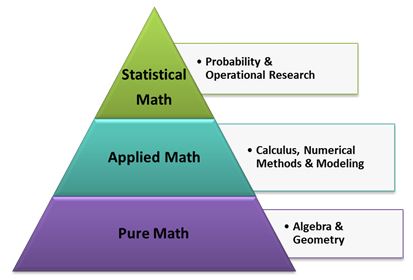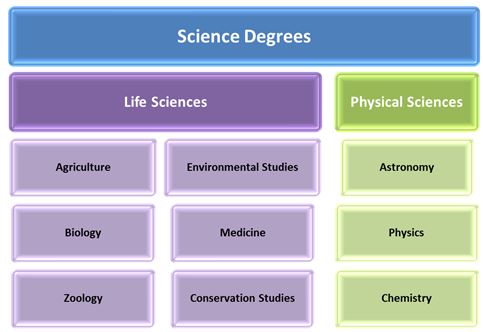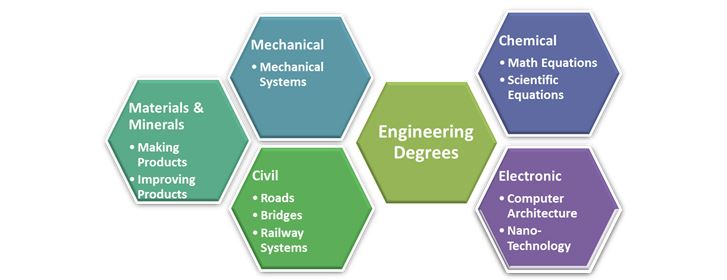These are the degrees with the most influence over our economy. Science, Technology, Engineering and Math majors make up the STEM industry and occupations. All of which are on the edge of technological advances and continually working to improve the standard of living. STEM graduates go on to discover new medicines, create new programs and design more functional structures. Science, engineering and math graduates ultimately control how our environment expands and stabilizes. Studying how the most basic things work and interact, these students invent technology that affects the daily operations and capabilities of all other industries.
Math

Studied alone, math degrees are a study of theory. These degrees are an exercise in critical thinking. Math majors can take any theoretical problem and turn it into numbers, which allows them to turn it into an equation. Ultimately, students learn how to form and evaluate risk analyses.
In the Classroom
Math majors start out with a review of the basics. Their first year or two is spent going over and stabilizing a foundation built of pure math skills, such as basic algebra and geometry. After getting their foundation in place, math students go on to theoretical math or applied mathematics.
Calculus, mathematical methods and numerical models allow students to apply their basic skills in just about any situation. Math majors double as ultimate problem solvers. This leads to a math major’s most useful skill set. Statistics is the study of probability and operational research.
Math students will find themselves doing majority of their work alone or in a math lab. These labs are equipped with computers, programs and student assistants to help with difficult assignments or to use as a reference point.
In the Office
Working with both numbers and computers, math degrees provide an education that can double as a foundation for other majors and be used in various occupations. They also instruct students on how to present their work clearly and concisely so that others may easily understand it.
In the work force, these are the skills of actuaries, mathematicians or research analysts. Using numbers to solve theoretical problems is in the job description for each of these occupations. They are specifically designed for math students, especially the occupation of mathematician. These individuals specialize in critical thinking and are consistently developing new theoretical numerical equations to solve various problems.
 Actuaries use their skills to determine the risk and cost of events that may or may not happen. They serve as a form of economic damage control. Each fall, hurricanes may or may not happen. If they do, these are the workers who predict how much their potential damage will cost. Research analysts theorize over mostly concrete objects. Using their skills to improve management operations, they use theories to efficiently export different materials or increase production.
Actuaries use their skills to determine the risk and cost of events that may or may not happen. They serve as a form of economic damage control. Each fall, hurricanes may or may not happen. If they do, these are the workers who predict how much their potential damage will cost. Research analysts theorize over mostly concrete objects. Using their skills to improve management operations, they use theories to efficiently export different materials or increase production. Science
Math skills and degrees double as stepping stones toward an education in science. There are two main types of science degrees, life science and physical science. Both use theoretical math skills to understand and manipulate how something works. Physical science degrees focus on life at its simplest, understanding how individual molecules affect grown human beings. These students are the future astronomers, physicists and chemists. Their studies focus on breaking something apart only to build it back up again.
In the Lab

Understanding something requires an ability to dissect it into individual pieces, allowing each to be viewed and studied independently of others. Knowing how each little piece functions independently of others allows scientists to put them back together. It also allows them to isolate a problem, potentially improving the internal structure of something studied.
Life science degrees take a different approach. These degrees are focused on external studies as opposed to the internal studies of physical science degrees. Instead of studying the interactions of molecule relationships, life science students study the interactions of populations and environments. They focus on creating optimal co-existence between an environment and every factor influencing it.
Biologists, zoologists, agricultural and medical scientists are the offspring of life science degrees. These occupations share one thing in common, the conservation of life. A population’s influence over a habitat is studied and observed in hope of conserving the original animals and plants existing there. Life science students use math skills to evaluate how much food a specific population needs and how long a specific environment can produce it.
In the Field
Science students study their subject in an educational setting that resembles the environment of their potential future occupation. Life scientists conduct most of their research and work in the field. For agricultural scientists, this is a very literal description. Physical scientists, such as chemists and physicists, spend most of the academic career in a lab. This does not usually change when they enter the workforce.
Every scientific occupation requires experiments to be conducted, analyzed and explained. However, the education of life and physical scientists are very different. This difference is reflected in how their work is conducted. Life scientists are educated in theorizing, whereas, physical scientists deal with much more hands on work. Theorizing and thinking critically are best developed in group work, which serves as a focus of life science classes. This equips students with excellent communication and teamwork skills. Physical science students hone their interpersonal motivation and organization skills with individual research projects.
These differences in class structure even affect the way these students present information. Physical scientists are taught to be to the point and easily understood, using lists and short sentences. The opposite of this style, argumentative theoretical writing is the specialty of life science students.
Engineering
Engineering degrees are built on mathematical and scientific concepts. These are the students who provide a society with the products and services it needs to exist comfortably within its environment. All products created by engineers are tailored to a population. Engineering students use scientific and mathematical methods to evaluate the social and economic impact of a specific product. 

There are five specific engineering degrees students could specialize in, which focus on the lifespans of different products. Engineering degrees are an education in product production from start to finish. They instill students with an ability to conceptualize ideas, design and create them. Engineers produce everything from bridges and roads to computer technology.
Many products are built through team effort. They often depend on someone doing their part before engineers can do theirs. For this reason, engineers develop excellent communication skills, responding quickly and efficiently in both verbal and written communication forms. Effective communication can require some creative effort, so can working within a budget. At the bottom of it all engineers are builders and inventors. Their jobs automatically depend on a certain amount of creativity to both conceptualize and produce a product.
